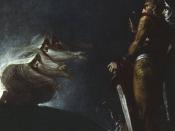The quote stated by R. J. Nosliw claims that good literature teaches the reader "not merely about art, but about life itself"ÃÂ can have many different meanings. One way that it can be interpreted as is that good books teach people not only about the art of writing but about life and how certain actions can effect it. I agree with this quote because good books can teach people about how to live their lives.
The play Macbeth by Shakespeare is one good example of literature that teaches "not merely about art, but about life itself."ÃÂ There are many examples throughout the play that teach the reader or audience about life.
One example would be the actions taken by Macbeth after receiving the prophesies from the three witches. "None of woman born shall harm Macbeth"ÃÂ and "Macbeth shall never vanquished be until Great Birnam Wood to high Dunsinane Hill shall come against him"ÃÂ were two of the prophesies that Macbeth obtained from the witches.
Macbeth took these prophesies for truth and assumed that he could now not be harmed. Macbeth was later killed By Macduff who had been "from his mother's womb untimely ripped,"ÃÂ meaning that he had not been literally born from a woman.
Macbeth also thought himself to be invincible because he believed that the wood could never move. This was not what the witches had meant. The wood moved by way of Malcolmn's soldiers.
Macbeth took what the witches said to be truth and did not question other possibilities. This teaches the reader to be wary of things that are too good to be true or things that could have hidden meanings. Macbeth interpreted the witches words to his benefit.
The theme of equivocation that is apparent throughout Macbeth also teaches the reader about life. Equivocation or deceit comes from many different situations in the play and in real life. The witches equivocate with Macbeth through their prophesies, Lady Macbeth equivocates to hide her involvement in the murder and Macbeth also equivocates to hide his involvement in the murder and his dealings with other characters in the play.
The theme of equivocation throughout the play Macbeth teaches the reader about trusting the words and actions of others.
These themes in Macbeth teach the reader "not only about art but about life itself."ÃÂ The play teaches the reader about certain aspects of life that are not so often questioned, such as trusting the words and actions of others and not taking their advice for granted. Macbeth shows us that their is usually a down side to things that seem not to have one.





